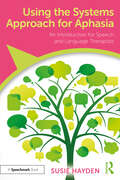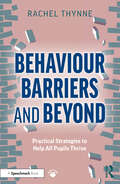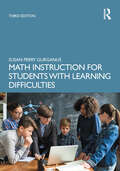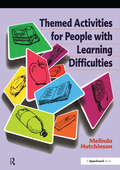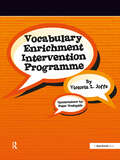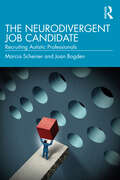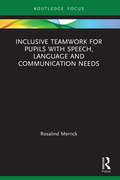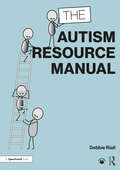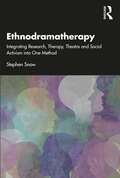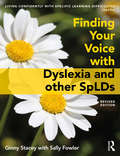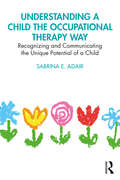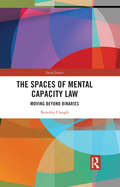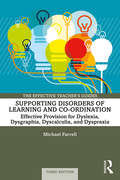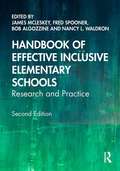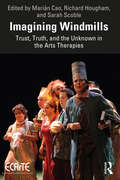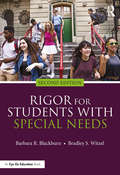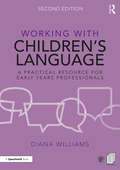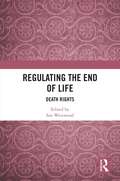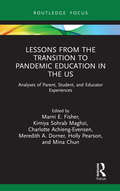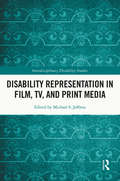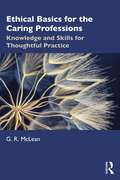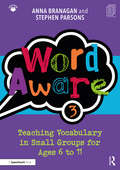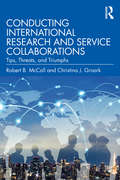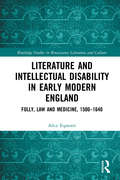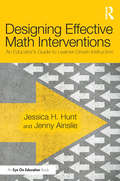- Table View
- List View
Using the Systems Approach for Aphasia: An Introduction for Speech and Language Therapists
by Susie HaydenUsing the Systems Approach for Aphasia introduces therapists to systems theory, exploring the way in which a holistic method that is already a key part of other health and social care settings can be employed in aphasia therapy. Detailed case studies from the author’s own extensive experience demonstrate how systemic tools can be incorporated into practice, offering practical suggestions for service delivery and caseload management in frequently overloaded community health services. Exploring the treatment process from first encounters, through the management of goals and attainments, to caring for patients after therapy has ended, the book demonstrates a method of delivering therapy in a way that will better serve the people who live with aphasia and their families, as well as the clinician themselves. Key features of this book include: • An accessible overview of systems theory and its use in aphasia therapy. • Consideration of how current popular ideas such as self-management, holistic rehabilitation and compassion focussed therapy can be incorporated to provide the best treatment. • Guidance on when and how to involve families based on case studies. • Case studies throughout to fully illustrate systemic approaches. An essential resource for both students and seasoned clinicians, the theory explored in this book will provide a fresh approach to therapy and new skills for working with people with aphasia and their families.
Behaviour Barriers and Beyond: Practical Strategies to Help All Pupils Thrive
by Rachel ThynneThis practical resource helps school staff to reframe behaviour as a means of communicating a need, ensuring they can sensitively and effectively support children with a range of Social, Emotional and Mental Health (SEMH) needs and Special Educational Needs and Disabilities (SEND). With case studies and examples woven throughout, the book focuses on relational and strength-based approaches to improve mental health and wellbeing, self-esteem, sense of safety and, in turn, behaviour and educational outcomes. All advice is carefully designed to have the maximum positive impact on the child and minimum impact on teacher time and resources. Key features include: ◾ Accessible explorations of a range of difficulties and their effects on school life ◾ A variety of supportive strategies, tips and advice, designed to be easy to implement effectively within a busy classroom ◾ A focus on building and maintaining positive relationships, making the classroom a safe learning environment Small adjustments can make a huge difference to wellbeing, whether they are for those with a diagnosis, with SEND, with SEMH needs, with anxiety, or just those having a hard time. This book will be an essential tool for teachers, SENCOs and school leaders in both mainstream and specialist settings.
Math Instruction for Students with Learning Difficulties
by Susan Perry GurganusThis richly updated third edition of Math Instruction for Students with Learning Difficulties presents a research-based approach to mathematics instruction designed to build confidence and competence in preservice and inservice PreK- 12 teachers. Referencing benchmarks of both the National Council of Teachers of Mathematics and Common Core State Standards for Mathematics, this essential text addresses teacher and student attitudes towards mathematics as well as language issues, specific mathematics disabilities, prior experiences, and cognitive and metacognitive factors. Chapters on assessment and instruction precede strands that focus on critical concepts. Replete with suggestions for class activities and field extensions, the new edition features current research across topics and an innovative thread throughout chapters and strands: multi-tiered systems of support as they apply to mathematics instruction.
Themed Activities for People with Learning Difficulties
by Melinda HutchinsonUser-friendly and practical, this is an excellent resource for all professionals looking to run creative sessions with people with profound and complex learning difficulties. Using a selection of twenty everyday objects, it provides resource materials, ideas and flexible structures to extend and complement professionals' existing approaches. It examines a range of teaching approaches, ideas for adapting activities and equipment, and how to present materials and tasks to the student while providing ideas, work outlines, activities and methods, recording sheets and photocopiable materials. It can be used with individuals and groups in a variety of settings, including educational establishments, day provisions or at home and is designed to provide opportunities for participation at all ability levels. With the help of this book, the list of object-based activities is endless!
Vocabulary Enrichment Programme: Enhancing the Learning of Vocabulary in Children
by Victoria JoffeThis book helps to enhance the understanding and use of vocabulary in secondary school students and young adults. Specifically designed for older children and young adults with language and communication needs, this practical language programme was created by a specialist speech & language therapist with input from secondary school teachers and students. The Vocabulary Enrichments Programme: focuses on enhancing the understanding and expression of vocabulary and word meanings in students aged from 8 to 18 aims to create an awareness of how improved vocabulary knowledge can be used to enhance learning in school and social interactions in school and home environments encourages an awareness and interest in words and language, introduces the concept of words and meanings and identifies their role and use in language, communication and social interaction introduces the word map and explore the rich networks of information attached to each word, including the meanings and make up of words using root and base words, suffixes and prefixes, synonyms and antonyms, and the etymology (origins) of words focuses on themes taken from the National Curriculum, including living and non living organisms, planet Earth and the world, the human body, emotions, healthy living, and occupations enhances the understanding and use of figurative and idiomatic language as well as more compound and complex sentence structures introduces a range of cueing techniques to aid in word retrieval. This book provide effective strategies for word learning to encourage independent word learning skills. It teaches an effective, efficient and realistic use of the dictionary as a tool for word learning and explore the role of the thesaurus in enhancing oral and written work.
The Neurodivergent Job Candidate: Recruiting Autistic Professionals
by Joan Bogden Marcia ScheinerThis book provides guidance on recruiting, interviewing, and onboarding practices that will allow employers to successfully hire neurodivergent professionals into inclusive, competitive employment. Today, 35% of 18-year-olds with an autism spectrum diagnosis attend college, yet they have a 75–85% under-employment and unemployment rate after graduation. While organizations are looking to expand their diversity and inclusion hiring efforts to include neurodivergent professionals, current recruiting and interviewing practices in general are not well-suited to this. With over one-third of the US population identifying as neurodivergent, employers need to address how to attract this talent pool to take advantage of a meaningful segment of the workforce. Readers of this book will gain an understanding of how to guide their organizations through the creation of recruiting, interviewing, and onboarding processes tailored to neurodivergent professionals in any field. Written by authors with extensive experience working in the corporate world and consulting with Fortune 1000 companies on autism hiring efforts, this book is targeted at employers, acknowledging their perspective. Structured as a reference guide for busy recruiters, hiring managers, and supervisors, this book can be read in its entirety, in relevant sections as needed, or used as a refresher whenever necessary. This book also provides a background on the thinking styles of autistic individuals, giving the reader a deeper understanding of how to best support neurodivergent jobseekers.
Inclusive Teamwork for Pupils with Speech, Language and Communication Needs (Routledge Research in Special Educational Needs)
by Rosalind MerrickThis book provides a rationale for teaching inclusive teamwork and for understanding communication as a collective endeavour. It shows how teamwork can be taught within schools and emphasises the role that classmates have in facilitating good communication, particularly in the face of difficulty. Grounded in evidence from hours of therapy and analysis of children’s accounts of communication and children’s interactions with their peers, the book explores the components of teamwork by looking carefully at the way schoolchildren really interact. It draws on research from the fields of education, psychology and speech and language therapy to propose the framework for a programme suitable for children aged 7 to 14 years, designed to include pupils with speech, language and communication needs. The programme includes activities, a set of criteria to use as an outcome measure and examples of the way that children and young people have responded in practice. In using the inclusive teamwork programme outlined in this book, teachers have the potential to support all children in developing rapport, effective communication and problem-solving skills. Providing a framework designed to meet the needs of all learners, this book will be highly relevant reading for students of education, speech and language therapy and educational psychology, as well as speech and language therapists and practitioners in the field of education.
The Autism Resource Manual: Practical Strategies for Teachers and other Education Professionals
by Debbie RiallThis highly practical resource book is full of realistic and achievable strategies to help teachers to support neurodiverse students in a range of situations that, whilst often seemingly insignificant, can quickly become substantial and disruptive challenges in the mainstream classroom. Written with the busy teacher in mind, chapters are easy to dip in and out of, with jargon-free language and simple explanations which are easy to understand and put into practice. Clear chapters explore a variety of situations and topics to help children engage in their learning and make the classroom a safe and inviting place to be for autistic students. Key features include: Practical and achievable strategies to support autistic students in the mainstream classroom Real-life scenarios to help you find concrete solutions to issues as they arise Memorable mantras and quick quotes to help embed strategies in everyday practice for both students and teachers Photocopiable and downloadable resource sheets Written by an advisory teacher for autism with a wealth of experience, this book will be an invaluable tool for both primary and secondary teachers in mainstream settings, as well as other education professionals.
Ethnodramatherapy: Integrating Research, Therapy, Theatre and Social Activism into One Method
by Stephen SnowEthnodramatherapy explores the integration of the performance ethnography method, known as ethnodrama, with the principles and practices of drama therapy to establish a sound theoretical formulation for ethnodramatherapy, and considers its use as art, as therapy, as research and as a vehicle for social justice. The book begins by defining ethnodramatherapy – an original synthesis created by the author through deep study and practice of Mienczakowski’s enthnodrama, combined with 35 years of his own practice and research in drama therapy, creative arts therapies and therapeutic theatre. The book describes the origins of ethnodramatherapy, along with its evolution and method. It then delves into applications of the practice highlighted by five case studies with different audiences in different settings. Subjects include adults with developmental disabilities, female adolescents in youth protection, caregivers for loved ones with mental illnesses and Chinese students exploring controversial issues of oppression in China. Complex ethical issues are reviewed and suggestions are made on how to deal with some of the challenging ethical situations that are likely to arise in the ethnodramatherapy process. What emerges is a powerful tool that harnesses theatrical art, ethnographic research and the clinical techniques of drama therapy to create a potential for emancipatory experience for both performers and audiences. This exciting and dynamic synthesis of drama therapy, performance ethnography, theatrical art and social activism will be of interest to the whole community of theatre practitioners and scholars who use theatre to effect individual and social change, including the disciplines of applied theatre, theatre education, experimental theatre, performance studies, and, of course, drama therapy, psychodrama and the other creative arts therapies.
Finding Your Voice with Dyslexia and other SpLDs
by Ginny Stacey Sally FowlerFinding Your Voice with Dyslexia and other SpLDs is an essential guide to living with dyslexia and other specific learning difficulties (SpLDs). The book provides readers with a practical guide to expressing and developing ideas and feelings. Uniquely designed for dyslexic/ SpLD readers, this book discusses how individual people function and will help readers to: •understand how they think•know what they can do to maintain clear thinking•know how they can positively contribute to any situation in which they find themselves.When people with SpLD find their voice, they gain the self-esteem and confidence to tackle all elements of life (study, employment, general living) and to negotiate sucessfully with those around them. The book contains stories, insights, examples, tips and exercises, presented in a user-friendly way throughout. The book has also been designed for non-linear reading and each chapter includes a ‘dipping-in’ section to guide the reader. The book does not have to be read as solid, continuous text from start to finish: it can be read more like a travel guide.As well as providing vital assistance to people with dyslexia and other specific learning difficulties, this book will benefit anyone supporting, living or working with dyslexic/ SpLD people by helping them to understand more about the dyslexic/ SpLD world.
Understanding a Child the Occupational Therapy Way: Recognizing and Communicating the Unique Potential of a Child
by Sabrina E. AdairThis book uses an occupational therapy way of thinking to guide the reader towards observing, understanding, and communicating the needs of children to foster a supportive environment. Presented in accessible, everyday language, this book takes a holistic approach of looking at a child from what makes them a unique person, what activities they are trying to accomplish, and what environment they are in. Each chapter helps readers identify, describe, and clearly articulate a different aspect of the child’s environment and how it may affect them, the way that they process different sensory inputs, what their behaviors may be telling us, and how they learn. By recognizing each child’s unique story and effectively communicating their story to others, the reader can identify the most effective ways to support a child to meet a child’s needs and set them up for success. Therapists, educators, parents, and childcare workers will all benefit from the simple strategies outlined in this book to enrich a child’s learning.
The Spaces of Mental Capacity Law: Moving Beyond Binaries (Social Justice)
by Beverley CloughThis book explores the conceptual spaces and socio-legal context which mental capacity laws inhabit. It will be seen that these norms are created and reproduced through the binaries that pervade mental capacity laws in liberal legal jurisdictions- such as capacity/incapacity; autonomy/paternalism; empowerment/protection; carer/cared-for; disabled/non-disabled; public/private. Whilst on one level the book demonstrates the pervasive reach of laws questioning individuals mental capacity, within and beyond the medical context which it is most commonly associated with, at a deeper and perhaps more important level it challenges the underlying norms and assumptions underpinning the very idea of mental capacity, and reflects outwards on the transformative potential of these realisations for other areas of law. In doing so, whilst the book offers lessons for mental capacity law scholarship in terms of reform efforts at both domestic and internationals levels, it also offers ways to develop our understandings of a range of linked legal, policy and theoretical concepts. In so doing, it offers new critical vantage points for both legal critique and conceptual change beyond mental capacity law. The book will be of interest to researchers in mental capacity law, disability law and socio-legal studies as well as critical geographers and disability studies scholars.
Supporting Disorders of Learning and Co-ordination: Effective Provision for Dyslexia, Dysgraphia, Dyscalculia, and Dyspraxia (The Effective Teacher's Guides)
by Michael FarrellThis revised and updated third edition, previously titled The Effective Teacher's Guide to Dyslexia and Other Learning Difficulties (Learning Disabilities), unravels the complexity of specific learning difficulties in an accessible and user-friendly way. Each chapter provides key information about the disorder in question, giving a clear definition before discussing prevalence, causal factors, identification, and assessment and provision. Implications for the curriculum and related assessment, pedagogy, resources, therapy/care, and school and classroom organisation are explained, allowing providers to reflect and adapt their practice in response to the needs of the individual. The book informs effective provision, with the aim of encouraging the best achievement and personal and social development for children and young people. The book authoritatively and lucidly addresses issues associated with • impairment in reading/dyslexia, • impairment in written expression/dysgraphia, • impairment in mathematics/dyscalculia, and • developmental co-ordination disorder/dyspraxia. Recognising the importance and the challenge of multi-professional working, the book relates provision to the roles of parents and carers alongside that of the practitioner. Underpinned by research and widely held professional judgement, this will prove a practical, readable, and inspiring resource for professionals in the UK, US, and elsewhere including teachers, therapists, psychologists, and students entering these professions.
Handbook of Effective Inclusive Elementary Schools: Research and Practice
by James McLeskeyNow in its Second Edition, this seminal handbook offers a comprehensive exploration of how students with disabilities might be provided classrooms and schools that are both inclusive and effective. With an enhanced focus on the elementary level, this new edition provides readers with a richer, more holistic understanding of how inclusive settings operate in K-5, featuring expanded chapters on principal engagement, teacher preparation, district-level support, school-based improvement practices, and more. Fully revised and updated to reflect changes in the field, each chapter synthesizes the research, explores if and how this knowledge is currently used in schools, and addresses the implications for practice and directions for future research.
Imagining Windmills: Trust, Truth, and the Unknown in the Arts Therapies
by Richard Hougham Sarah Scoble Marián CaoImagining Windmills presents a compilation of scholarly chapters by selected authors of global standing in the arts therapies. This book reflects the theme of the 15th International Conference of the European Consortium for Arts Therapies (ECArTE), held in Alcalá de Henares, Spain, birthplace of Miguel de Cervantes. This innovative work seeks to further understanding of arts therapy education, practice and research and incorporates current thinking from art therapists, dance-movement therapists, dramatherapists and music therapists. Writers from Belgium, Germany, Greece, India, Israel, Italy, The Netherlands, Spain, Sweden, UK and USA combine to give an international voice to the book, which celebrates cultural distinctiveness, while also presenting shared intercultural developments in the professions. This interdisciplinary publication explores questions of the unknown and the imagined, misconception, delusion, truth and trust in the arts therapies. It enquires into ways in which education and the practice of the arts therapies engage with the imagination as a place of multiple realities, which may lead us closer to finding our truth. This book will be of interest and relevance not only to those in the arts therapeutic community, but also to a broad audience including those in related professions – for instance psychology, sociology, the arts, medicine, health and wellbeing and education.
Rigor for Students with Special Needs
by Bradley S. Witzel Barbara R. BlackburnThis practical guide explains how to raise the rigor for students with special needs so they can achieve higher levels of learning. Bestselling author Barbara R. Blackburn and intervention expert Bradley S. Witzel provide helpful information on assessment, planning, co-teaching models, high expectations, common obstacles, and emphasizing positive outcomes. This second edition offers new, expanded instructional strategies for literacy and math, as well as strategies that work across subject areas. In addition, each chapter is filled with tools and examples to help you implement the ideas. Perfect for general and special educators and supervisors, the book also comes with a study guide so you can collaborate on the book with building or district colleagues. With the practical information in this book, you’ll understand how to teach with higher expectations and rigor so that all students can feel successful.
Working with Children’s Language: A Practical Resource for Early Years Professionals (Working With)
by Diana WilliamsThis revised and updated second edition of Working with Children’s Language has been created to support practitioners who work with young children with delayed language acquisition. Rooted in a developmental theory of language learning, it covers topics such as attention control and listening, the role of play, verbal comprehension and the acquisition of spoken expressive language. Each chapter offers a straightforward overview of current research relating to the specific language skill before introducing a wealth of targeted games and activities that can help support the development of those skills. Key features include: • A structured approach to language learning that can be followed as a programme or adapted for informal use by individual practitioners. • Accessible activities, games and ideas suitable for small group or individual intervention, linked to specific aims based on developmental norms. • Photocopiable and downloadable resources, including a record sheet to track progress in each skill against aims and outcomes for individual children. Clearly linking theory and practice in an engaging and easy-to-follow format, this is an invaluable resource to support children in early years settings and Key Stage 1 whose language is delayed, but who are otherwise developing normally. It is a must-have book for early years practitioners, teachers, SEND professionals and speech and language therapists with varying levels of experience.
Regulating the End of Life: Death Rights
by Sue WestwoodDeath Rights is a collection of cutting-edge chapters on assisted dying and euthanasia, written by leading authors in the field. Providing an overview of current regulation on assisted dying and euthanasia, both in the UK and internationally, this book also addresses the associated debates on ethical, moral and rights issues. It considers whether, just as there is a right to life, there should also be a right to death, especially in the context of unbearable human suffering. The unintended consequences of prohibitions on assisted dying and euthanasia are explored, and the argument put forward that knowing one can choose when and how one dies can be life-extending, rather than life-limiting. Key critiques from feminist and disability studies are addressed. The overarching theme of the collection is that death is an embodied right which we should be entitled to exercise, with appropriate safeguards, as and when we choose. Making a novel contribution to the debate on assisted dying, this interdisciplinary book will appeal to those with relevant interests in law, socio-legal studies, applied ethics, medical ethics, politics, philosophy, and sociology.
Lessons from the Transition to Pandemic Education in the US: Analyses of Parent, Student, and Educator Experiences (Routledge Research in Education)
by Marni E. Fisher; Kimiya Sohrab Maghzi; Charlotte Achieng-Evensen; Meredith A. Dorner; Holly Pearson; Mina ChunThis volume narrates and shares the often-unheard voices of students, parents, and educators during the COVID-19 pandemic. Through close analysis of their lived experiences, the book identifies key patterns, pitfalls, and lessons learnt from pandemic education. Drawing on contributions from all levels of the US education system, the book situates these myriad voices and perspectives within a prismatic theory framework in order to recognise how these views and experiences interconnect. Detailed narrative and phenomenological analysis also call attention to patterns of inequality, reduced social and emotional well-being, pressures on parents, and the role of communication, flexibility, and teacher-led innovation. Chapters are interchanged with interludes that showcase a lyrical and authentic approach to understanding the multiplicity of experience in the text. Providing a valuable contribution to the contemporary field of pandemic education research, this volume will be of interest to researchers, academics, and educators with an interest in the sociology of education, online teaching and eLearning, and those involved with the digitalization of education at all levels. Those more broadly interested in educational research methods and the effects of home-schooling will also benefit.
Disability Representation in Film, TV, and Print Media (Interdisciplinary Disability Studies)
by Michael S. JeffressUsing sources from a wide variety of print and digital media, this book discusses the need for ample and healthy portrayals of disability and neurodiversity in the media, as the primary way that most people learn about conditions. It contains 13 newly written chapters drawing on representations of disability in popular culture from film, television, and print media in both the Global North and the Global South, including the United States, Canada, India, and Kenya. Although disability is often framed using a limited range of stereotypical tropes such as victims, supercrips, or suffering patients, this book shows how disability and neurodiversity are making their way into more mainstream media productions and publications with movies, television shows, and books featuring prominent and even lead characters with disabilities or neurodiversity. Disability Representation in Film, TV, and Print Media will be of interest to all scholars and students of disability studies, cultural studies, film studies, gender studies, and sociology more broadly.
Ethical Basics for the Caring Professions: Knowledge and Skills for Thoughtful Practice
by G. R. McLeanThis book trains students of the caring professions, across health and social care, in the basic philosophical skills and knowledge needed to deal with the ethical aspects of their profession. It shows why ethical education is required, and teaches the skills of reasoning that equip professionals to think critically about the theories and arguments used in ethical discussions. It demonstrates how we can be confident that we can rely on common moral ground; but it also points out how we need to recognise the influence of different world-views, and to note how, on some issues, these can lead us in starkly different directions. It explains relevant philosophical theories, and evaluates their strengths and weaknesses – particularly in relation to what is required for proper professional ethics. It shows how to employ the commonly accepted framework of four ethical principles – beneficence, non-maleficence, autonomy, and justice. These various matters are then illustrated in two extended case studies, which focus on the problem of euthanasia, and the question of screening for disability and the value of human life. Ethical Basics for the Caring Professions is designed for use on all health and social care and human services courses on ethics and values. It will also be of interest to academics and professionals working within these fields.
Word Aware 3: Teaching Vocabulary in Small Groups for Ages 6 to 11
by Stephen Parsons Anna BranaganWord Aware 3 is a comprehensive, practical and engaging resource that focuses on teaching vocabulary and word learning skills to children aged 6 to 11 years who have vocabulary learning needs. For many children, particularly those with Special Educational Needs and Disabilities (SEND) or those whose home language isn’t English (ELL or EAL learners), the vocabulary of the classroom can be a barrier to learning. This book outlines how to best support these children who require extra help, offering concrete, easy-to-implement activities and resources for use in small groups, to maximise the impact on learning and open up access to the curriculum. Word Aware 3: Takes a highly practical, evidence-based and curriculum-focused approach to vocabulary learning that supports a broad range of learners Includes photocopiable and downloadable planning, intervention and evaluation resources Provides staff training resources and an overview video presented by the authors This book can be used as an adjunct to Word Aware 1, or as an intervention on its own. Although it is most suited to children aged 6 to 11 years, it may be adapted for older students with significant learning needs. It is an essential resource for teaching assistants and learning support assistants and will also save time for special educational needs co-ordinators (SENCOs) and speech and language therapists (SaLTs) who are keen to establish effective vocabulary interventions.
Conducting International Research and Service Collaborations: Tips, Threats, and Triumphs
by Robert B. McCall Christina J. GroarkConducting International Research and Service Collaborations: Tips, Threats, and Triumphs provides academic researchers, as well as non-profit and private professionals, with much-needed guidance on how to plan, implement, and manage international research and intervention projects. Accessibly written and illustrated throughout with examples and case studies of projects from Robert B. McCall and Christina J. Groark's wide-ranging and decades-long experience of cross-border collaborations, this book outlines how to prepare for and ensure success of cross-border research projects and interventions, how to embrace unique circumstances you may encounter, and what to do if things go wrong. Each chapter covers a general domain of concerns, advice, and lessons learned in conducting international collaborative projects followed by concrete illustrations that pertain to them. Key topics covered include launching projects and working with stakeholders, travelling and living abroad, cultural considerations, planning and funding, administrative issues, dealing with crises, and successfully implementing and disseminating findings effectively. This comprehensive guide is ideal for researchers and project managers – from large, global organizations to small NGOs, human services, private industry, and other fields embarking on such projects, as well as university students and academics.
Literature and Intellectual Disability in Early Modern England: Folly, Law and Medicine, 1500-1640 (Routledge Studies in Renaissance Literature and Culture)
by Alice EquestriFools and clowns were widely popular characters employed in early modern drama, prose texts and poems mainly as laughter makers, or also as ludicrous metaphorical embodiments of human failures. Literature and Intellectual Disability in Early Modern England: Folly, Law and Medicine, 1500–1640 pays full attention to the intellectual difference of fools, rather than just their performativity: what does their total, partial, or even pretended ‘irrationality’ entail in terms of non-standard psychology or behaviour, and others’ perception of them? Is it possible to offer a close contextualised examination of the meaning of folly in literature as a disability? And how did real people having intellectual disabilities in the Renaissance period influence the representation and subjectivity of literary fools? Alice Equestri answers these and other questions by investigating the wide range of significant connections between the characters and Renaissance legal and medical knowledge as presented in legal records, dictionaries, handbooks, and texts of medicine, natural philosophy, and physiognomy. Furthermore, by bringing early modern folly in closer dialogue with the burgeoning fields of disability studies and disability theory, this study considers multiple sides of the argument in the historical disability experience: intellectual disability as a variation in the person and as a difference which both society and the individual construct or respond to. Early modern literary fools’ characterisation then emerges as stemming from either a realistic or also from a symbolical or rhetorical representation of intellectual disability.
Designing Effective Math Interventions: An Educator's Guide to Learner-Driven Instruction
by Jessica H. Hunt Jenny AinslieDesign effective, learner-driven math interventions with this accessible and thought-provoking guidebook. Learn how to set up instruction to promote participation and understanding, plan purposeful, targeted tasks, develop student thinking, and create tools to assess student work in a way that measures learning, not just performance. Chapters explore questions that educators frequently struggle with when designing interventions, offering user-friendly research and evidence-based strategies to help overcome common hurdles. This book is essential reading for anyone seeking an adaptive approach to Tier 2 and 3 interventions that positions struggling students as competent learners.
